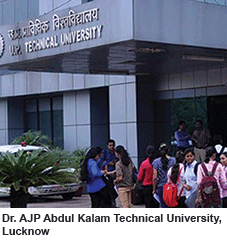 An estimated 20,000 teachers of 640 private professional education colleges (including engineering, technology, business management, architecture, town planning, pharmacy, applied science and applied arts & crafts institutes) affiliated with Lucknow’s Dr. APJ Abdul Kalam Technical University (AKTU) in Uttar Pradesh, India’s most populous — and arguably most lawless — state, are fictitious or ‘ghost’ entries on their muster rolls.
An estimated 20,000 teachers of 640 private professional education colleges (including engineering, technology, business management, architecture, town planning, pharmacy, applied science and applied arts & crafts institutes) affiliated with Lucknow’s Dr. APJ Abdul Kalam Technical University (AKTU) in Uttar Pradesh, India’s most populous — and arguably most lawless — state, are fictitious or ‘ghost’ entries on their muster rolls.
Under rules framed by the Delhi-based All India Council for Technical Education (AICTE), all technical and professional education-dispensing institutions are obliged to hire an adequate number of faculty to maintain prescribed teacher-pupil ratios. But a recent investigation by AKTU indicates this law is practised more in the breach.
On May 12, AKTU registrar K.K. Choudhary in a circular letter to offender colleges/institutes, said that when the PAN (permanent account numbers issued by the income tax authorities to all direct taxpayers) of faculty of affiliated colleges were investigated by the university, they were found to be of fictitious persons or registered in other names. The offender institutes were issued notice to explain the anomalies and discrepancies. “After we received numerous complaints about the possibility of fake entries in faculty muster rolls, we asked colleges to upload the educational and PAN card details of all faculty,” says Choudhary.
According to educationists in Lucknow, a well-oiled racket has been in operation in the 785 technical colleges affiliated with AKTU (estb.2000). Technical colleges are mainly promoted by fly-by-night individuals with capability to cut through the thicket of state government rules, regulations and red tape to construct often grandiose professional education institutions. Subsequently, when AICTE inspection task forces visit the institute to validate compliance with infrastructure, faculty strength, teacher-pupil norms etc, entire faculties are ‘borrowed’ from other institutes for the duration of the inspection with muster rolls filled in with ghost and/or borrowed names. Thus at the inspection stage, these colleges fulfill the minimum norms of AICTE to receive affiliation. Subsequent expansion of capacity and student intake are permitted on the assumption that the parameters (including a teacher-student ratio of 1:60) will be maintained. But this huge scam has highlighted the infirmities of AICTE’s one-time physical inspection system.
Formerly known as the Uttar Pradesh Technical University (estb.2000), AKTU was renamed after the late Dr. Abdul Kalam, a scientist-scholar and former President of India (2002-2007). Currently, it offers 1,111 study programmes in 785 government and private colleges/institutes. But in the academic year 2015-16, a mere 51 percent of 214,612 seats of these colleges were filled. Despite their dicey reputation, private technical education institutes entice gullible and under-educated school-leavers through false and misleading advertising to sign up for sub-standard programmes of shell colleges.
The rackets and scams rife in higher education in India’s most populous state are symptoms of a deeper malaise. In 2014, of the aggregate 126,884 seats offered by government, aided and unaided technical colleges in UP, a whopping 100,737 or 79.39 percent had no takers, mainly because of chronic faculty shortages. Nevertheless, after it was elected to power in 2012, the incumbent Samajwadi Party government has promoted four engineering colleges. But three years later, not a single teacher has been appointed in these colleges.
Evidently, even poor gullible students have wised up to the reality that the so-called technical education certificates issued by the majority of the state’s professional education institutions are barely worth the paper they are written on.
Puja Awasthi (Lucknow)